The startup roundup series spotlights students and recent alumni who are starting a new business or enterprise.
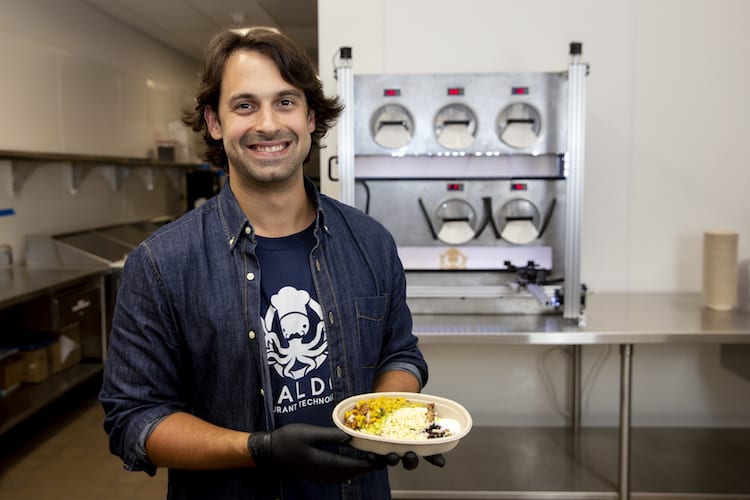
Caldo Restaurant Technologies
Co-founders: Jose Alonso MBA 19, CEO
Joshua Peterson, MS engineering 19, CTO
Caldo CEO Jose Alonso stands in front of his startup’s fast food automation station, explaining how each row of removable canisters works in tandem to fill an order. Some will hold hot food like meat and rice, while others will hold cold food like sour cream at the correct temperature, controlled by automated sensors.
“If it’s lettuce it needs to be below 40 at all times,” he said. “If it’s chicken it needs to be above 140 degrees at all times. If there’s ever a moment the food is not within regulation, the sensor makes it increase or decrease.”
Alonso and his co-founder Joshua Peterson, MS 19 (engineering), believe the machine—a high-tech assembly line for fast food and fast casual restaurants—could help owners to slash their labor costs, improve food safety, and better survive the restaurant industry’s razor-sharp margins.
“All you’ll need is to install this station in your kitchen and you’ll immediately create a better customer experience while saving on labor,” said Alonso, whose team last week moved the 150-lb automation station from a downtown Berkeley office space to a café kitchen on the Berkeley campus. “You’re also making the food safer. No one’s sneezing into your food, and you can possibly start running your business at later hours.”
The station will fix burrito bowls, salads, pastas, and poke bowls that no hand will touch during the assembly process. A system of pumps will dispense your sauce of choice with the push of a button. It (A long-term goal is to allow customers to order food directly from the machine’s screen, like a vending machine on steroids.)
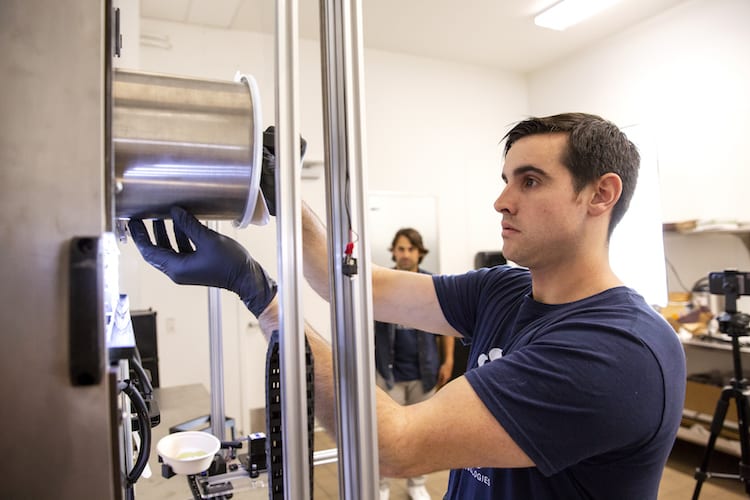
Alonso came to Haas on a personal mission. A native of Puerto Rico, Alonso grew up in a family that ran restaurants in several Latin American countries, which was often difficult financially, he said.
“Despite having top quality food, my family’s restaurants struggled,” he said. “So, for me, the key question was ‘why?'”
“It takes startups to come in and disrupt”
Alonso met Peterson after he reached out to the Berkeley Engineering master’s program for help with his idea. “None of this could have been done without an engineer,” Alonso said. “I had an idea around how to make the restaurants more efficient but it was the most theoretical thing you could have imagined.”
Peterson, who grew up on the New Jersey coast working summers in a fish market, said he was drawn to Alonso’s idea for its profitability potential and for the chance to have an impact on the restaurant industry. “I worked on many engineering projects that were really cool, but you don’t really see an end goal,” he said. “I liked having a real concrete application, a tangible one, and I fell in love with the idea of the project and the company.”
The automation station, which will be leased to customers, who receive training and maintenance for the machines, could shake up the staid restaurant industry, said Rhonda Shrader, executive director of the Berkeley Haas Entrepreneurship Program (BHEP).
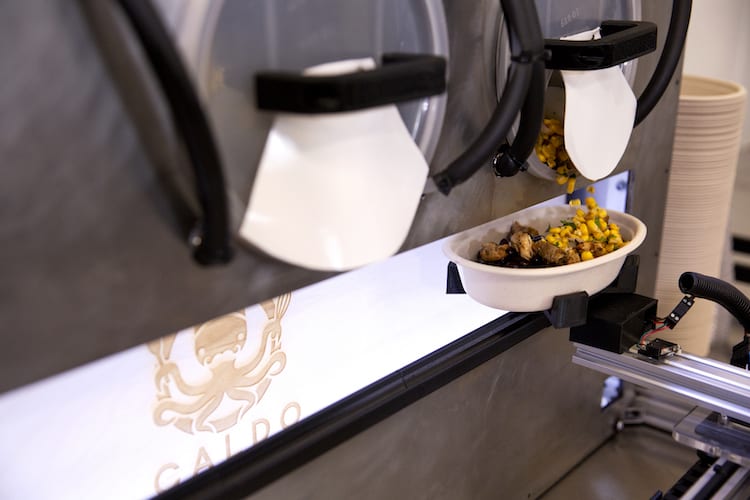
“Fast food places are not innovative,” she said. “Their last big innovation was a drive-through window, and that required a lot of infrastructure change. It takes startups to come in and do the disruptive innovation.” The biggest obstacle will be scaling to meet customer demand, she said. “Once people decide that they want these they’ll want them now and Caldo will have to keep up.”
Designed to be inexpensive
With an early idea for Caldo already percolating when he arrived at Haas, Alonso went through the UC Berkeley Launch accelerator program with Peterson. After conducting more than 200 interviews with restaurant managers and employees, Alonso identified labor costs as a major reason why restaurants failed.
Success at Launch (Caldo was named one of 12 Launch finalists) and at the MIT-Rabobank Food & Agriculture Innovation Prize competition last May have helped build the startup’s profile.
Now, Caldo, which means “broth” in Spanish, is building its second version of the automation station, investing about $4,000 in tools and materials from a grant the team received from the Trione Student Venture Fund on the tools and steel parts.
“We’ve consciously designed this to be inexpensive because we don’t agree that a restaurant should be investing $250,000 to re-outfit its kitchen,” said Alonso, who counts Jean Prevot, director of operations at Danone Manifesto Ventures, and Megan Mokri, MBA 16, the founder of healthy vending machine maker Byte Foods, as mentors. “If you make something modular and inexpensive that works with the shy margins in food, there’s a higher chance it will work.”
Eat Makhana
Co-founders: Mallika Chawla MBA 20
Amruta Gadgil
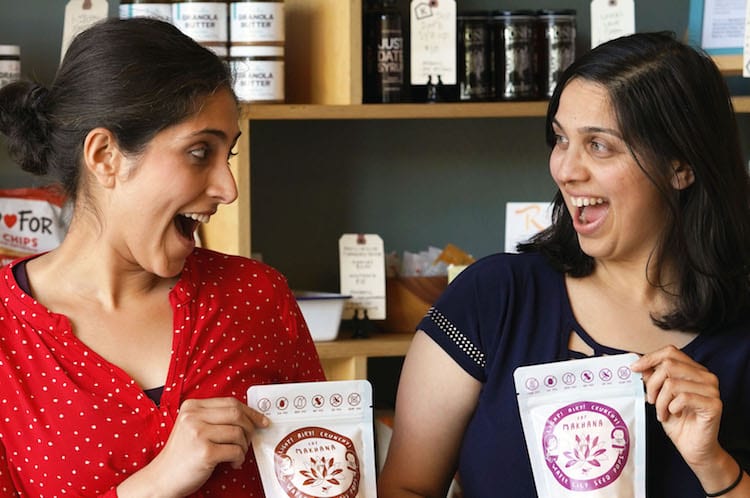
When Mallika Chawla was applying to Haas, she found herself snacking a lot to offset deadline stress. That’s when a startup idea struck.
“As I ate, I thought, would Americans appreciate makhana?” said Chawla, MBA 20. Makhana, a favorite childhood snack in India, is a puffed and roasted water lily seed. “It’s a bit like popcorn, crunchy and salty, but rich with protein,” she said.
Chawla never fancied herself an entrepreneur. But the former Goldman Sachs economist soon found herself in her kitchen cooking the first batches of makhana for startup Eat Makhana. Joining her was her co-founder Amruta Gadgil, a buyer for Whole Foods Market. The pair, who met in 2017, made the snack using seeds imported from farmers in India.
Then they headed to a farmer’s market in Palo Alto to see if people would like it.
“During the initial days, we couldn’t keep up with the demand and always ran out,” Chawla said.
Early sales led Chawla to believe there was a healthy market for the snack, which is tasty, inexpensive, and free of gluten, soy, and nuts, essential for parents of kids with allergies.
They took their fledgling company through the UC Berkeley Launch accelerator program, conducting more than 60 interviews as they worked to understand the potential market for their product and developed a business plan. (The team was a Launch finalist.)
As the startup progressed—it’s now backed by UC Berkeley venture fund Arrow Capital and the Dorm Room Fund, which was founded by UC Berkeley alumnus Jeremy Fiance in 2016—they’ve moved cooking operations to a culinary incubator called Kitchen Town in San Mateo. They’re now selling makhana online and in 40 Bay Area natural grocery stores, adding new flavors such as chili lime to the original Himalayan pink salt makhana.
Despite early success, Chawla finds the entrepreneurial life has its challenges. “Entrepreneurship is a roller coaster ride,” she said. “There are days when I question my life choices. But support from family and friends and validation from customers makes it all real and worth it.”
Kyte
Co-founders: Ludwig Schoenack, MBA 19
Nikolaus Volk
Francesco Wiedemann
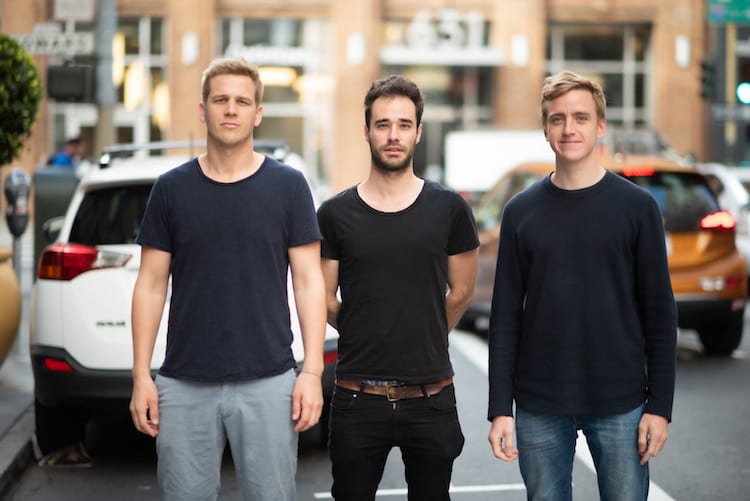
Ludwig Schoenack, MBA 19, co-founder of the recently launched Kyte, is hoping to make renting a car in the Bay Area as easy as ordering a pizza.
But Schoenack, who started Kyte with Nikolaus Volk and Francesco Wiedemann, doesn’t call Kyte a car rental business—because technically it’s not. Unlike Hertz or Avis, Kyte owns no vehicles. Instead, Kyte partners with car rental companies, renting and delivering their cars to customers in the Bay Area.
Kyte is designed to be easy to use. With as little as two hours’ notice, around the clock, a driver can reserve a vehicle on a smartphone or desktop app, identifying a time and place to pick up and drop off the car
When customers are finished with the car, they park it wherever they want—just like a Lime scooter or a Jump bike—and a Kyte freelance driver will be waiting to pick it up. This eliminates the headache of finding parking or returning the car to the airport or rental office, Schoenack said.
The startup makes money by renting vehicles from the big rental companies at discounted daily rates. It profits after covering the cost of vehicle delivery.
At Haas, Schoenack, who met his co-founders through mutual friends, launched the startup squad, a team of matchmakers who help connect Haas students to entrepreneurs at the UC Berkeley incubator Skydeck.
But his goal was always to meet other entrepreneurs and start his own company, which led him to start Kyte. The team was accepted at Skydeck, where it received mentorship and office space; and received a $5,000 Trione Student Venture Fund grant, allotted by the Berkeley Haas Entrepreneurship Program to early-stage startups.
Since launching, Kyte has garnered financial support from the Alchemist Accelerator, along with several angel investors who were part of—or who have invested in—Uber, Lime, Bird, and Jump. Now the team is in the process of raising a seed round and is looking to hire more people.
Schoenack said the first months of business have been encouraging, with sales increasing steadily and strong repeat business.
Most of Kyte’s customers are people who have given up owning a car, but don’t want to rent from one of the big corporate auto rental companies, Schoenack said. “The user experience is less intuitive, their technology isn’t as slick, and they don’t focus enough on the customer,” Schoenack said.